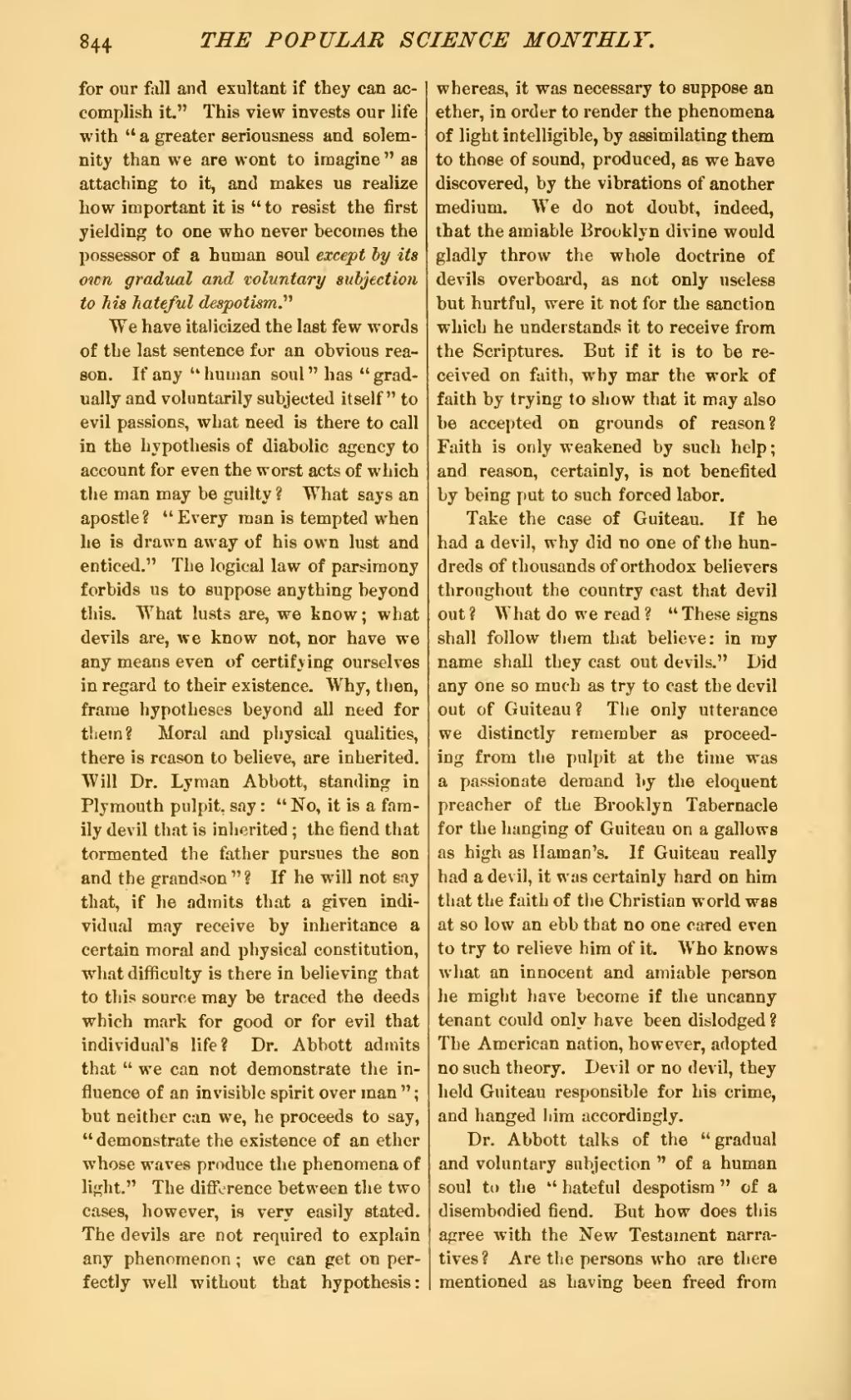for our fall and exultant if they can accomplish it." This view invests our life with "a greater seriousness and solemnity than we are wont to imagine" as attaching to it, and makes us realize how important it is "to resist the first yielding to one who never becomes the possessor of a human soul except by its own gradual and voluntary subjection to his hateful despotism."
We have italicized the last few words of the last sentence for an obvious reason. If any "human soul" has "gradually and voluntarily subjected itself" to evil passions, what need is there to call in the hypothesis of diabolic agency to account for even the worst acts of which the man may be guilty? What says an apostle? "Every man is tempted when he is drawn away of his own lust and enticed." The logical law of parsimony forbids us to suppose anything beyond this. What lusts are, we know; what devils are, we know not, nor have we any means even of certifying ourselves in regard to their existence. Why, then, frame hypotheses beyond all need for them? Moral and physical qualities, there is reason to believe, are inherited. Will Dr. Lyman Abbott, standing in Plymouth pulpit, say: "No, it is a family devil that is inherited; the fiend that tormented the father pursues the son and the grandson"? If he will not say that, if he admits that a given individual may receive by inheritance a certain moral and physical constitution, what difficulty is there in believing that to this source may be traced the deeds which mark for good or for evil that individual's life? Dr. Abbott admits that "we can not demonstrate the influence of an invisible spirit over man"; but neither can we, he proceeds to say, "demonstrate the existence of an ether whose waves produce the phenomena of light." The difference between the two cases, however, is very easily stated. The devils are not required to explain any phenomenon; we can get on perfectly well without that hypothesis: whereas, it was necessary to suppose an ether, in order to render the phenomena of light intelligible, by assimilating them to those of sound, produced, as we have discovered, by the vibrations of another medium. We do not doubt, indeed, that the amiable Brooklyn divine would gladly throw the whole doctrine of devils overboard, as not only useless but hurtful, were it not for the sanction which he understands it to receive from the Scriptures. But if it is to be received on faith, why mar the work of faith by trying to show that it may also be accepted on grounds of reason? Faith is only weakened by such help; and reason, certainly, is not benefited by being put to such forced labor.
Take the case of Guiteau. If he had a devil, why did no one of the hundreds of thousands of orthodox believers throughout the country cast that devil out? What do we read? "These signs shall follow them that believe: in my name shall they cast out devils." Did any one so much as try to cast the devil out of Guiteau? The only utterance we distinctly remember as proceeding from the pulpit at the time was a passionate demand by the eloquent preacher of the Brooklyn Tabernacle for the hanging of Guiteau on a gallows as high as Haman's. If Guiteau really had a devil, it was certainly hard on him that the faith of the Christian world was at so low an ebb that no one cared even to try to relieve him of it. Who knows what an innocent and amiable person he might have become if the uncanny tenant could only have been dislodged? The American nation, however, adopted no such theory. Devil or no devil, they held Guiteau responsible for his crime, and hanged him accordingly.
Dr. Abbott talks of the "gradual and voluntary subjection" of a human soul to the "hateful despotism" of a disembodied fiend. But how does this agree with the New Testament narratives? Are the persons who are there mentioned as having been freed from
